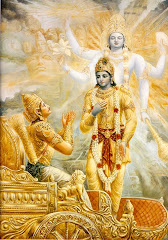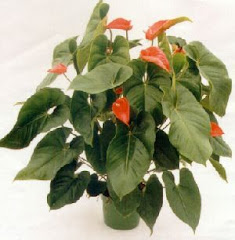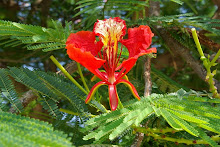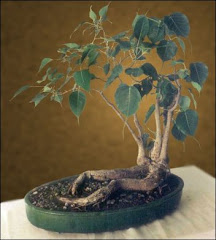
In this post I'll write about... how a village was transformed into R.K. Narayan's fabled town... and about the genius that was Shankar Nag.
Early in the 1980s, director Shankar Nag handed John Devraj a sheet of paper. It was the script for Malgudi Days, based on R.K. Narayan's stories set in a fictional town in Karnataka. From the words on that page, Devraj, a sculptor, musician, art director and town planner, was asked to create Malgudi in Agumbe, a village in the Western Ghats, roughly 400 km from Bangalore, with a population of about 180 families.
Devraj began to fabricate carts, statues, trains, avenues, shops and temples. "I had to conceptualize everything from scratch," he says. "I had to then make everything by hand-often working 20 hours a day." Twenty-one years after Doordarshan took it off the air, Devraj's handiwork is now available for viewing in Big Home Video's two-volume DVD pack... as well as complete VCD set. Go grab them! What are you waiting for?
The task of building Malgudi was made even more daunting by Agumbe's isolation and by Nag's obsession with detail, note Devraj and several members of the crew. Production controller Jagadish Malnad recalls how one bright day, when everything was in place for a shot, a cloud suddenly floated in front of the sun. "Shankar motioned to me and asked me to move the cloud," he says.
Nag, who was killed in a car accident near Bangalore in September 1990 at the age of 36, invested loads of energy and enterprise into imagining the minutiae of life in Malgudi. "Nothing you see on screen was a result of an accident or chance," says Arundhati Nag, his wife, who also acted in the series. "He went about things with precision. He once asked Malnad to bring in a donkey (accompanied by its master) from Theerthahalli, 20km from Agumbe."
Arundhati says the cast practically lived in the village "in fits and starts" over the three years it took to make the serial. "Agumbe was not accustomed to film crews, so they just let us into their homes," she says. "The village became such a huge part of our lives that my daughter Kavya, who was a year old, went to school there."
Like most of Narayan's works, Malgudi Days is woven with ordinary concerns: the financial worries of a goat-herder, the glee with which a long-awaited letter is received. Nag was intent on preserving Narayan's vision, says Ashok Mandanna, who played the role of a postman in the episode 'The Missing Mail'. "We made the serial at a time when it was possible to take over an entire village and transform it into a fictitious place," says Mandanna. "The logistics and cost of such an enterprise now would prevent people from remaking it."
Arundhati agrees with Mandanna. "If Shankar were to make it today, I don't know if he would try it," she says. "I don't think you can recreate what he did in 1987." That became obvious when director Kavita Lankesh remade the series in 2006. Those episodes, which are also included in this package, lacked the full original cast and were shot in a bustling Agumbe that was twice removed from the sleepy village of Nag's time. No wonder they failed to impress audiences when they aired on Doordarshan.
Here are some excellent captures from Agumbe... almost 25 years after Malgudi Days was shot... courtesy Photographer Aniruddha Chowdhury (link).
For more on John Devraj... Art Director for 'Malgudi Days'... for its 56 episodes, shot on 35mm film format, (English and Hindi): Link.
About Shankar Nag: Shankar Nag's foray into TV would be memorable with the classic Malgudi Days on Doordarshan, which would be familiar to many viewers. Can any one of us forget Swami? I still remember, on listening to the brilliant opening musical score by L. Vaidyanathan... the 'Ta na na tana na na naaaaaaaa' title song/melody, I would just drop everything and rush towards the TV. Such was the attraction it held. For the next 30 minutes or so, I would just lose myself in the story of Swami. In these days of mindless Saas Bahu serials, how much I miss the endearing simplicity and brilliance of Malgudi Days...
Shankar Nag originally known as Shankar Nagarkatte... and lovingly called Shankar Anna ('Anna' means elder brother in Kannada) - by the people of Karnataka... was the younger of the Nag brothers. His elder brother Anant Nag, was a leading actor in Kannada cinema, and also familiar to Hindi audiences via offbeat movies like Ankur, Nishant, Kalyug, Bhumika to name a few. Shankar Nag initially was a theatre artiste, and started his career with the Marathi Theatre in Mumbai. Hailing from the Uttara Kanara region, he was fluent in Kannada, Konkani and Marathi. It was during his theatre days, that he met his future wife Arundhati, who later went on to become a well-known actress in her own right.
Born on 9 November 1954 in Karnataka (in Mallapur village from Honnavar taluk (Near Kumta) of Uttara Kannada district)... Shankar Nag acted as a lead actor in more than 90 Kannada movies from 1978-1990. He co-wrote "22 June 1897", an Indian National Award winning Marathi film.
Girish Karnad offered him the role of a mercenary in the epic movie, "Ondanondu Kaaldalli" (which literally means Once Upon a Time). This 1978 movie was loosely based on Akira Kurosawa's 1954 masterpiece, "Seven Samurai", and was directed by Girish Karnad. One of the finest movies ever made, the movie has some fascinating stunt scenes, involving Kalaripayattu.
His debut film (as an actor) fetched Shankar a National Award at the Delhi International Film Festival. Thus began his film career, where, in a span of 12 years (from 1978 to 1990) he acted in some 90 Kannada movies, as a leading man, besides co-producing (with actor-brother Anant Nag) and directing some films like "Minchina Ota" (a rare example of a heist movie in Kannada) "Janma Janmada Anubandha" and "Geetha" (both of which had melodious music by South Indian music maestro Ilayaraja).
Commercial film producers took notice of Shankar Nag and he began acting in typical masala movies. Shankar was an unconventional hero with an unshaven face, distinct swagger, dark eyes and a rough voice. Although he had never undergone any martial arts training, he earned the sobriquet of 'Karate King'. His popular films include Auto Raja, Geetha, CBI Shankar, S.P. Sangliana, Accident and Minchina Ota.
Shankar's role in the masala flick "Auto Raja", made him the darling of the auto drivers in Bangalore... and he earned yet another sobriquet... that of 'Auto Raja'. It is quite a common sight, to see his potrait on auto rickshaws in Bangalore. Apparently... to this day, in Bangalore, auto drivers would not accept any money from Arundathi Nag (née Rao), whenever she goes to Ranga Shankara (in Bangalore).
Even in "Apoorva Sangama", where he co-starred with Kannada matinee idol Dr. Rajkumar, he made an impact, not a mean feat, considering Annavaru's (tr: beloved elder brother) legendary charisma. He was one of the very few actors who could straddle both the commercial and parallel/art house cinema, without appearing to compromise. But then that was Shankar Nag. He was not a man who cared for labels or someone who craved for recognition. He was a person totally passionate about whatever he did, and whatever he believed in. He was as comfortable in a total masala flick, as he was in a more serious venture.
Apart from TV and movies, Shankar's greatest contribution would be to the cause of Kannada Theatre. Even during the peak of his stardom, he never forgot his theatre roots, and always took an active part in it. He co-founded Sanket, an amateur theatre group with his wife. His group bought famous Kannada plays like Anju Mallige, Barrister, Sandhya Chaya, to stage. His last stage production was Girish Karnad's famous play Naga Mandala, which he co-directed along with Surendra Nath. The Ranga Shankara in Bangalore, is a testimony and a tribute to his vision. Along with Girish Karnad, Anant Nag and B.V. Karanth he would forever be recognized as one of the giants of Kannada Theatre.
Shankar Nag died in a car crash at Anagodu village on the outskirts of Davanagere town on the morning of 30 September 1990, while proceeding to Dharwad with his wife Arundhati Nag and daughter Kavya, for the shooting of his film "Jokumaraswamy". His untimely death in 1990, was a great loss... not only to the Kannada movie industry and Kannada theatre. It was a great loss... to performing arts in general... and to viewers like you and me. 'Coz it is hard to find such a versatile and talented genius.
Note: Some info courtesy link.
Photograph: A caricature of people seated at the foot of a statue of a man. Two birds are hovering above the statue, a bicycle is parked at its side, a cow is roaming by near it, and a bus is seen in the backdrop. The people at the foot of the statue include a street vendor, an old man and two others; they are engaged in conversation. Pic courtesy link.














Informative, interesting and nicely presented.
ReplyDeleteMalgudi is one of my favorite serials till date. Few years back I downloaded it's title track.
ReplyDeleteThanks for writing this. Considering the crap movies being made these days (some with weird titles like kalgejje, 1day, kalmanja, etc), kannada film industry would have reached great heights if Shankar Nag were alive today. A genius man indeed.
ReplyDeleteAs for Malgudi Days, writing crime fiction is easy; but describing simple things in life is so damn difficult. And that's where R K Narayan's genius lies. Love his books and love the TV series.
Sadly, people nowadays choose Chetan Bhagat over R K Narayan. Morons, I say.
@ Jagdish Bali: Thanks you for those kind words. Appreciate it.
ReplyDelete@ Rachit: Great!
ReplyDelete@ Karthik: You said it!
ReplyDelete"Sadly, people nowadays choose Chetan Bhagat over R K Narayan."
... Errr... methinks by writing his name alongside the legendary R.K. Narayan in the above line... you have elevated Chetan's status ;)
P.S. His debut novel... 'Five Point Someone' makes for a pretty good read. The rest are not worth the paper they're printed on...
defin8ly a CLASSIC malgudi days,... be it ta na na na na na naaaa.. aur swami.. but trust me watchin in backi in dos days on dordarshan was fun.. but watchin it now on DVDs aint dat fun.. i wud still prefer watchin it over dordarshan instead of a dvd pack...
ReplyDeleteIt was truly a classic and those days there were just so few of them that they became part of life.
ReplyDeleteIf you want to take a free trip down memory lane , many episodes can be downloaded from net, use video joiner software if they are in parts . . link for easy search
http://www.youtube.com/watch?v=BHyj5T2Ztyc
as usual well researched post, that is characteristic of your posts Roshmi
@ Sobhit: Well, as they say: to each his own. With a DVD one can watch Malgudi Days anywhere, anytime :)
ReplyDelete@ Sunilji: Actually DD telecasted many great serials... most of whom were very popular and went on to be iconic. The era of Cable TV and mushrooming channels... have killed creativity, bolster several social evils and stereotypes... and go by the quantity over quality mantra. Sadly!
ReplyDelete... I have the complete VCD set of Malgudi Days... and can watch the episodes anytime, anywhere :) They also contain the ones directed by Kavita Lankesh.